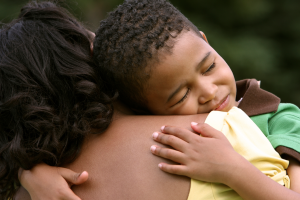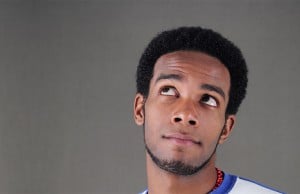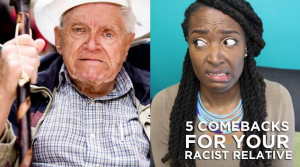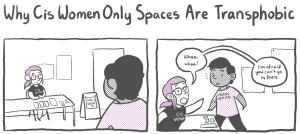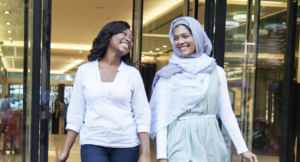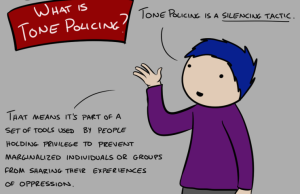A few weeks ago on December 31, I was getting ready for a wonderful New Year’s Eve with my friends and chosen family. It was a bittersweet night, too, because it was the night our local lesbian nightclub, Wall Street, would be shutting its doors for the last time.
Although I wouldn’t be there at its last show because I’d decided to host my own party, I knew I would treasure my memories of it — the burlesque, the drag shows, the drinks, the dancing, and, of course, all my lovely queer friends that I went there with.
But that very morning, I heard it — a man’s arrogant voice coming from somewhere in my office building: “I’m definitely going out to Wall Street for New Year’s tonight to look at the freaks!”
The freaks? I thought. Oh, right, that’s what he thinks of people like me and my friends, and all the lovely and fabulous performers we’ve seen on the stage at Wall Street.
Most straight cis folks would never say something like that about a LGBTQIA+ space, but I’ve observed similar attitudes playing out in all sorts of small ways throughout the times I’ve spent in these spaces.
While the man I overheard clearly has some deeply-ingrained bigotry I couldn’t hope to dislodge anytime soon, most straight cis folks I encounter in LGBTQIA+ spaces are liberal allies, there to support friends or experience something new. Yet, as well-meaning as they are, their intentions don’t always translate into appropriate, non-oppressive behavior in these spaces.
Here are some guidelines for allies who want to attend queer spaces in a respectful way.
1. Put Your Money Where Your Mouth Is (If You Can)
If you’re at a gay bar or club, tip well. If you participate in a queer-centered space or event, donate to the organization that maintains or sponsors it.
Among the queer community, it’s a sad and well-known fact that queer spaces, especially lesbian bars, are on the decline. One reason for this is that LGBTQIA+ people are increasingly accepted in “mainstream” society and have plenty of ways to safely hang out and meet potential partners than ever before.
While that’s a positive thing, of course, those benefits aren’t shared equally by all LGBTQIA+ people. Queer and trans people of color, for instance, still face disproportionate violence just for being themselves out in the world.
When safe(r) spaces like LGBTQIA+ bars and clubs disappear, it hurts all of us, but especially those who may still not be safe in other social spaces.
There are other reasons queer establishments are shutting down. As the formerly inexpensive neighborhoods they’re in gentrify, owners often can’t afford to pay the rent anymore. That seems to be what happened to my beloved Wall Street here in Columbus.
But cis straight “tourists” play a role, too. Last year, journalist Peter Lawrence Kane investigated the decline of LGBTQ bars and interviewed a few bartenders:
“‘We get a lot more tourists these days. It can feel like we work in a circus sideshow than a neighborhood queer bar,’ [barback Daniel Erickson] says, explaining that the influx of well-heeled newcomers into Williamsburg has led many longtime, ‘alternative’ regulars to move elsewhere. ‘I’ve noticed queer, drag or performance parties opening up in random spaces that move from month to month. Illegal, unconventional queer spaces that allow for a much more intimate expression and interplay between artists and the local community.’”
These “illegal, unconventional queer spaces” may be difficult to find for those not in the know, who have no choice but to watch as their favorite gathering spots shut down one by one.
So, if you’re a straight/cis ally entering these types of queer spaces, you need to be aware of the fact that, well-intentioned as it is, your presence there may be contributing to their slow decline. Help offset that by tipping generously.
2. Check Your Assumptions About Pronouns and Labels
The way someone looks or dresses, or the way their partner looks or dresses, does not imply anything about their gender, sexual orientation, or any other identity. So, try not to assume. While this is good advice for everyone in any situation, you’re even more likely to harm someone this way when you’re in a designated LGBTQIA+ space.
If you’re referring to someone you just met, try using gender-neutral terms unless they’ve told you how they identify.
There are few things more awkward than correcting someone who’s just introduced you to their friends as “this awesome girl I just met!” — when you’re actually not.
Remember that it’s always okay to ask someone which pronouns to use for them. Just make sure to ask “What are your pronouns?” or “Which pronouns should I use for you?” rather than “What are your ‘preferred’ pronouns?”
After all, cis people’s pronouns aren’t “preferred,” they’re just their pronouns. There’s no reason it should be any different for trans and non-binary people.
If you see what looks like a straight couple, remember that LGBTQIA+ spaces exist for trans and bisexual folks, too. One or both of them could still be queer, trans, or both. Coming up to them and making a joke about how you’re glad you’re not the only straight person there could come across poorly indeed.
3. If Someone You’re Not Into Hits On You, Decline Respectfully
Again, this is one of those bits of advice that’s useful almost universally, but being cruel about turning someone down does disproportionate damage when you’re a straight person in a queer space.
One big fear for many queer people about the increasing presence of straight people in our spaces is that they’ll react poorly (or even violently) if we flirt with them.
Bars, clubs, and other social spaces have traditionally been a way for queer people to meet partners and hook up, or at least dance with someone cute. Not everyone’s there for that, but some are, and these spaces are often the only place they feel comfortable approaching a cute stranger.
Of course, just because someone’s into our gender in general doesn’t necessarily mean they’ll be interested, and the possibility of rejection is something we’re all too aware of. But the awkward, indignant, and sometimes unsafe way in which some straight people respond to interest from a queer person is a different thing entirely.
If you’re going to enter a space that LGBTQIA+ people use to meet each other, know that you may get hit on by someone of your gender, so if that makes you uncomfortable in a way that it wouldn’t if it were someone of your preferred gender/s, ask yourself why.
Regardless, you don’t have to accept someone’s flirtations just because you’re in a queer space. If you’re not interested, it’s okay to politely say so.
Try saying so without immediately identifying yourself as straight: “Thanks for the drink, but I’m actually just here to support my friends.” “Sorry, I’m not looking for a hookup tonight.”
While there’s nothing wrong with being straight, there’s also nothing wrong with just not being interested, no further explanation needed.
And by the way, sexual harassment isn’t the same as flirting and it’s never okay, no matter what gender configuration it happens in. But homophobia sometimes leads straight folks to perceive any attention from a queer person as predatory and inappropriate, even when the same behavior from someone of their preferred gender would be read as flirting.
4. Remember that LGBTQIA+ Spaces and the People in Them Do Not Exist to Entertain You
The man in the story I shared earlier didn’t just have a very negative view of queer people – he also saw them as there for his entertainment. His New Year’s Eve plan was to go be entertained by the “freaks” at a lesbian nightclub.
Even if you don’t share his bigoted attitude, you may still be treating LGBTQIA+ spaces as if they’re there for you — they’re not. They’re there for LGBTQIA+ folks. If you also benefit from them in some way, that’s great, but always remember that that’s not what they were made for.
When you’re in a LGBTQIA+ space, don’t act like a tourist. Don’t gawk at people who look or act in ways that seem “weird” to you. Always ask permission before taking a photo of someone, even (especially!) if they seem to be in costume or engaged in some sort of performance.
Taking photos of drag or burlesque performers can be especially harmful in many ways. For instance, the flash can be distracting to them, and distracted is not what you want to be when you’re shaking your ass in six-inch heels.
If you put your photos on Facebook and make them available for free, that can take away from their own promotional photo sales, and many performers need all the income they can get.
It can also out them, which is extremely dangerous — many drag and burlesque performers have lives outside of LGBTQIA+ spaces, and they may not be out as performers, or as LGBTQIA+ at all.
If you’re a straight man and you see two women kissing or dancing, do not stare at them. They are not there for you. If you’re a straight man and you see two women that you wish were kissing or dancing, do not command them to kiss or dance. (Yes, this needs to be said.)
Even comments that you might think are respectful and appreciative can be anything but. I was once at a show with a partner that I was being cuddly with, and a fellow audience member – a man – came up afterwards to tell us that we “made” his night.
But we weren’t there for his entertainment. We were there for ourselves.
5. Know When to Stay Home
Many LGBTQIA+ spaces are open and welcoming to straight/cis allies. Bars, nightclubs, drag shows, political rallies and other activist events, gay/straight alliance meetings, Pride parades, and queer-centered performing arts (like concerts, plays, and so on) are all examples of spaces that are generally okay for allies to attend (unless otherwise specified).
These events benefit from the increased visibility that allies can bring, and many allies attend them in order to support their LGBTQIA+ friends. (For instance, my local straight friends are definitely welcome to come to my LGBTQIA+ community band concert!)
However, some spaces are not intended for allies.
Events that are specifically meant for discussing issues in the community, processing trauma related to homophobia and other forms of oppression, helping young LGBTQIA+ people find acceptance and come out, or meeting potential partners (ie speed dating events) may not be appropriate for you to attend if you’re straight/cis.
And because the LGBTQIA+ community comprises so many different identities, you may not be welcome in a particular space even if you do identify with some part of that alphabet soup. For instance, I should not attend a meeting specifically for trans women of color.
Some of my gay and lesbian friends would not be welcome at an event exclusively for bi-/pansexual folks. That’s okay. Sometimes people need safe spaces away from those who do not share their form of marginalization or oppression.
As a straight/cis ally, it’s particularly important for you to know when to step back because your presence might hurt rather than help.
If you’re unsure, ask some LGBTQIA+ friends who have participated in that space (or one like it). Be prepared to get some differing opinions! For instance, some queer people think that straight people should not attend Pride parades at all.
Some even think that bisexual people should not attend Pride events with “opposite”-sex partners (or at all), which is not an opinion I think very highly of. Get some different perspectives and then use what you’ve learned about homophobia, biphobia, and transphobia to come to your own conclusion.
***
As a straight/cis person, you might be tempted to read these guidelines and say, “But everyone should do that! Why are you singling me out?”
Yes, everyone should tip their bartender, be respectful to performers, check their assumptions, and be respectful to someone who is flirting with them respectfully. This includes queer or trans people.
But I’m addressing straight and cis allies because they don’t always understand how their actions in these spaces might be harmful.
While LGBTQIA+ people don’t emerge from the womb with a perfect understanding of oppressive dynamics either, many of us learn about them from our own experiences with them. Straight cis allies do not share those experiences.
As an ally, you can use your privilege to help LGBTQIA+ spaces continue to exist and serve the people they’re intended to serve. Spending time in these spaces can also be a ton of fun no matter how you identify.
Even though these spaces were not created with you in mind, you can still benefit from them — just make sure the benefit is mutual.
[do_widget id=’text-101′]
Miri Mogilevsky is a Contributing Writer for Everyday Feminism and a recently graduated with a Masters in Social Work and is starting a career as a counselor in Columbus, Ohio. She loves reading, writing, and learning about psychology, social justice, and sexuality, and is working on her cat photography skills. Miri writes a blog called Brute Reason, rants on Tumblr, and occasionally even tweets @sondosia.
Search our 3000+ articles!
Read our articles about:
Our online racial justice training
Used by hundreds of universities, non-profits, and businesses.
Click to learn more







